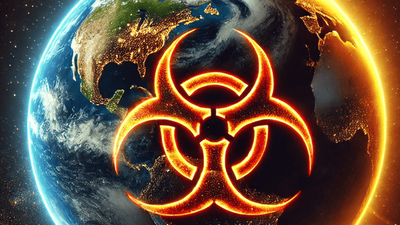Dr. Peter Hotez, a prominent advocate for mRNA vaccine technology during the COVID-19 pandemic, has recently stirred controversy with alarming predictions regarding future pandemics under a potential Trump administration. During an interview with MSNBC, Hotez claimed that the U.S. could experience multiple viral outbreaks beginning January 21, coinciding closely with Trump’s inauguration. He listed several viruses he believes could pose a threat, including bird flu, a new coronavirus, dengue fever, Zika, and classical illnesses like measles and polio. This forecast has been met with skepticism, especially from those questioning Hotez’s motivations and implications for public health narratives.
Critics have suggested that Hotez’s remarks may reveal a subconscious desire for a national health crisis, drawing comparisons to Freudian analysis. They argue that his prediction highlights a troubling trend among certain health advocates who utilize fear to push for funding and support for vaccines and public health initiatives. This sentiment was echoed by John Leake in a critique of Hotez, suggesting that his comments may not simply be warnings, but rather an eagerness for events that could validate his stance on vaccines and public health responses.
Compounding these worries is the emergence of a new illness in the Democratic Republic of Congo, dubbed “Disease X,” which has reportedly affected over 400 individuals and resulted in numerous fatalities. This coincidental timing with Hotez’s predictions has led to speculation about whether he is tapping into potential global health crises to further his agenda. Critics have posited that such commentary could be part of a broader narrative to invoke a sense of fear among the public, potentially stoking unfounded anxieties about future viral outbreaks tied to political circumstances.
Amidst this backdrop, alternative health solutions like The Wellness Company have gained traction, claiming relief from fears associated with pharmaceutical reliance and pandemic preparedness. The company advocates for a “Contagion Emergency Kit,” which includes various prescription medications such as Tamiflu, hydroxychloroquine, and ivermectin. The marketing strategy emphasizes self-reliance over dependency on mainstream pharmaceuticals, promising peace of mind should another health crisis arise.
The publicity around these kits raises critical discussions about the intersection of personal health, government trust, and pharmaceutical ethics. Proponents of the kit argue that it empowers individuals to take charge of their health with readily available medications, essentially countering a narrative of fear propagated by mainstream authorities. Testimonials from customers underline the perceived necessity for personal preparedness, framing this approach as both a responsible and proactive step for families in uncertain times.
Ultimately, criticism of Hotez and support for entities like The Wellness Company reflect a deeper societal divide regarding pandemic responses and the ownership of health choices. As the dialogue around future health threats continues, the discourse encapsulates fears about governmental and pharmaceutical powers amid a landscape marred by recent health crises. How these narratives develop in the face of scientific evidence and public perception will likely shape future health policies and individual behaviors, as the interplay between fear and preparedness remains a linchpin of public health discourse.

